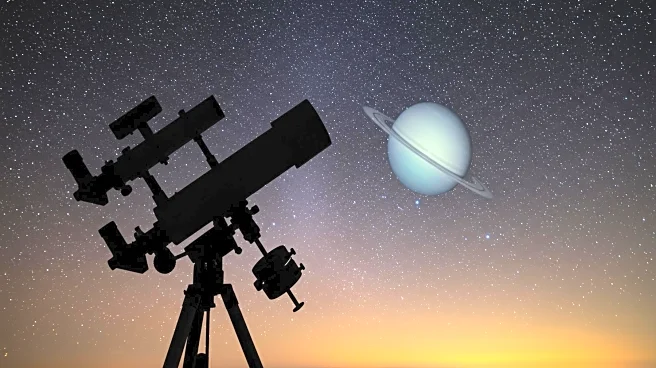What's Happening?
NASA's recent observation of a stellar occultation event involving Uranus has led to significant scientific discoveries about the planet's atmosphere. This event, which occurred in April 2025, allowed researchers to analyze how light from a distant star was altered as it passed through Uranus's atmosphere. The data collected has provided new insights into the atmospheric temperature, density, and pressure of Uranus, an ice giant that has not been extensively studied since the last major observations three decades ago. These findings are crucial for refining the understanding of Uranus's atmospheric dynamics and preparing for future missions to explore the planet's atmospheric layers more deeply.
Why It's Important?
The discoveries from the Uranus stellar occultation have profound implications for planetary science. Understanding the atmospheric dynamics of Uranus can enhance knowledge about ice giants, which are less studied compared to other planets in the solar system. This information is vital for future exploratory missions, potentially leading to advancements in space exploration technology and methodologies. The insights gained could also contribute to comparative studies of planetary atmospheres, aiding in the understanding of atmospheric processes across different celestial bodies. This event underscores the importance of international scientific collaboration in expanding the frontiers of space research.
What's Next?
The data from the Uranus occultation will likely inform the planning and execution of future missions aimed at exploring the planet's atmosphere in greater detail. Scientists may use these findings to develop new hypotheses about atmospheric phenomena on ice giants, potentially leading to targeted research initiatives. The broader scientific community may also engage in discussions and collaborations to leverage these insights for comparative planetary studies, enhancing the understanding of atmospheric dynamics across the solar system.
Beyond the Headlines
The event highlights the role of advanced observational techniques in uncovering hidden aspects of planetary atmospheres. It also emphasizes the importance of rare celestial events in providing unique opportunities for scientific discovery. The collaboration across international scientific communities fosters a sense of global camaraderie and shared knowledge, which is essential for tackling complex scientific challenges.










